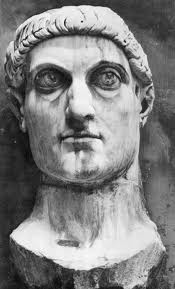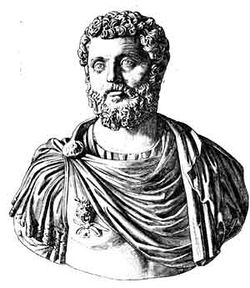Edict of Milan

While he ended the separation caused by Septimius Severus he would blend a form of Church and State that would undermine Christianity with a pseudo christian doctrine that was clearly contrary to the Doctrine of Jesus.
Edict of Milan
The Edict of Milan was a proclamation that established religious toleration for Christianity within the Roman Empire.
The written edict was the result of a political agreement concluded in Mediolanum (modern Milan) between the Roman emperors Constantine I and Licinius in February 313.
We are told that the Edict of Milan gave Christianity in general a sort of legal status.
Edict text
"When we, Constantine Augustus and Licinius Augustus, met so happily at Milan, and considered together all that concerned the interest and security of the State, we decided ... to grant to Christians and to everybody the free power to follow the religion of their choice, in order that all that is divine in the heavens may be favorable and propitious towards all who are placed under our authority."
Allowing the "free power to follow the religion of their choice" was an acceptance of the true meaning of the words of Paul in Romans 13 and his use of the Greek word exousia.
The significance of this proclamation can only be fully understood if we also comprehend the meaning of ""religion" at that time. Religion which was how a people cared for the needy of society and pure Religion was providing for them without looking to the "men who call themselves benefactors but exercise authority one over the others, a.k.a. the Fathers of the earth.
The Edict was proclaiming that private religion was accepted as legal. No one was going to have to register with the temples of Rome which managed the "free bread" of the Imperial Cult of Rome as public religion.
Christian Context
The Edict of Milan did provide some reprieve from the persecution imposed upon early Christians caring for their society in their network of free assemblies.
The Church instituted by Christ was able to serve the people during the dearths mentioned in Acts 11 as Paul and other brought relief and aid.
With the institution of the Corban of Christ the ministers of the Church were able to rightly divide the bread from house to house[1] on a local basis and also relief[2] on an international level as needed.[3]
Persecution began with jealousy and envy like that of the brothers of Joseph which led to the bondage of Egypt. That persecution took on a legal form with the Christian conflict with the state run temples of Rome. Romans and many Greek city states at that time were almost entirely dependent upon state supported legal charity or free bread offered through these temples. The Pharisees had done the same through the support of Herod who had built the temples of Jerusalem and Roma through which the Corban of the Pharisees would seize the hearts and minds of the people.
Septimius Severus
This spirit of jealousy and envy is prominent in self indulgent societies where the masses become accustomed to living at the expense of others. A melding of the right and left hand of government by mixing the role of Church and State through legal charity the same spirit of envy and jealousy will dominate. The same spirit is seen in the modern cancel culture but took on a legal status with Septimius Severus with his edicts of division between private religion and public religion.

Rome had outlawed private religion:
"Severus returned victorious from having vanquished the kings who had taken part with Nigar against him. He published his cruel edicts against the Christians in the year of Christ 202, the tenth of his reign. But the general laws of the empire against foreign religions, and the former edicts of several emperors against the Christians, were a sufficient warrant to many governors to draw the sword against them before that time; and we find that the persecution was very hot in Africa two years before, under the proconsul Saturninus..." [4]
A new door
Closing the door on the persecution of Septimius Severus did not close the door on envy and jealousy. There was a new deal that opened a door through which corruption could enter into society if not into the Church itself.
The Edict of Milan did not actually establish the "legal status" of the Church established by Christ. Jesus had done that already and Pontius Pilate affirmed that with his proclamation, nailing it to the cross.
It did establish a reprieve from persecution and allowed property to be restored to the existing Church. The long range consequence of this and subsequent edicts along with numerous councils by a new kind of christian would do more harm to the gospel of the kingdom than the persecutions.
What this edict did was make it legal to form and conduct private religion again but not entirely private for the State opened a door through which it might subsidize a Church spotting its religion.
"When you see that this has been granted to [Christians] by us, your Worship will know that we have also conceded to other religions the right of open and free observance of their worship for the sake of the peace of our times, that each one may have the free opportunity to worship as he pleases; this regulation is made that we may not seem to detract from any dignity of any religion." [5]
Instant Christians
What the Edict of Milan actually did was open the door to thousands of people who would claim to be Christian, elect Bishops to oversee their daily administration and literally form a distinctly different Church. That new church would appeal to the senate, as we see with Ambrose and to Constantine himself.
Christianity did not become the "state church of the Roman Empire" until AD 380 with the Edict of Thessalonica. By then there were large number of what might be called "instant Christians" who had converted to forms of Christianity designed by Constantine and men like Ambrose. These people formed an alternative to true Christianity that historically paralleled a pseudo Christianity that did not conform to the Sound Doctrine of Christ nor heed the warnings of the apostles.
With the exercise of authority, an acceptance of covetous practices and the redefinition of words that institution of Constantine became the forerunner of the Modern Church.
For his version of Christianity under their binding authority. “As guardian of Constantine’s favored religion”, certain churches and bishops were, “given legal rights and large financial donations.”[6]
These new converts to this false religion and their authoritarian bishops were willing to be subsidized by the the authority and power of Caesar. This new institution and its false prophets would change the appearance of "Christianity" to the people of the world distorting the Gospel of the Kingdom.
If you need help:
- Or want to help others:
Join The Living Network of The Companies of Ten
The Living Network |
Join Local group |
About |
Purpose |
Guidelines |
Network Removal
Contact Minister |
Fractal Network |
Audacity of Hope |
Network Links
Footnotes
- ↑ Acts 2:46 And they, continuing daily with one accord in the temple, and breaking bread from house to house, did eat their meat with gladness and singleness of heart,
- ↑ 1248 ~διακονία~ diakonia \@dee-ak-on-ee’-ah\@ from 1249; n f AV-ministry 16, ministration 6, ministering 3, misc 9; 34
- 1) service, ministering, esp. of those who execute the commands of others
- 2a) of the office of Moses
- 2b) of the office of the apostles and its administration
- 2c) of the office of prophets, evangelists, elders etc.
- 3) the ministration of those who render to others the offices of Christian affection esp. those who help meet need by either collecting or distributing of charities
- 4) the office of the deacon in the church
- 5) the service of those who prepare and present food
- ↑ Acts 11:29 Then the disciples, every man according to his ability, determined to send relief unto the brethren which dwelt in Judaea:
- Acts 14:1 And it came to pass in Iconium, that they went both together into the synagogue of the Jews, and so spake, that a great multitude both of the Jews and also of the Greeks believed.
- Acts 6:1 ¶ And in those days, when the number of the disciples was multiplied, there arose a murmuring of the Grecians against the Hebrews, because their widows were neglected in the daily ministration.
- ↑ The Lives of the Saints. Volume VII: July. 1866. Rev. Alban Butler (1711–73).
- ↑ "When you see that this has been granted to [Christians] by us, your Worship will know that we have also conceded to other religions the right of open and free observance of their worship for the sake of the peace of our times, that each one may have the free opportunity to worship as he pleases; this regulation is made that we may not seem to detract from any dignity of any religion." — "Edict of Milan", Lactantius, On the Deaths of the Persecutors (De Mortibus Persecutorum), ch. 48. opera, ed. 0. F. Fritzsche, II, p 288 sq. (Bibl Patr. Ecc. Lat. XI).
- ↑ Funk & Wagnalls New Encyclopedia Vol. 7 p.149
Links to other articles
Saved |
Eternal life |
The Blessed Strategy |
The Way |
Whosoever believeth |
Nailing it to His cross |
Worship |
Faith |
Hope |
Charity |
The Peaceful Majority |
Allegiance and Faith |
Unbeliever |
Grace |
Duty |
Keep the Commandments |
Bible |
Salvation |
Sacrifices |
Faithful |
Believer |
Consent |
Judge not |
Divers lusts |
Greed |
Lasciviousness |
Wantonness |
Dry Bones |
Gospel of the Kingdom |
Perfect law of liberty |
Network Purpose |